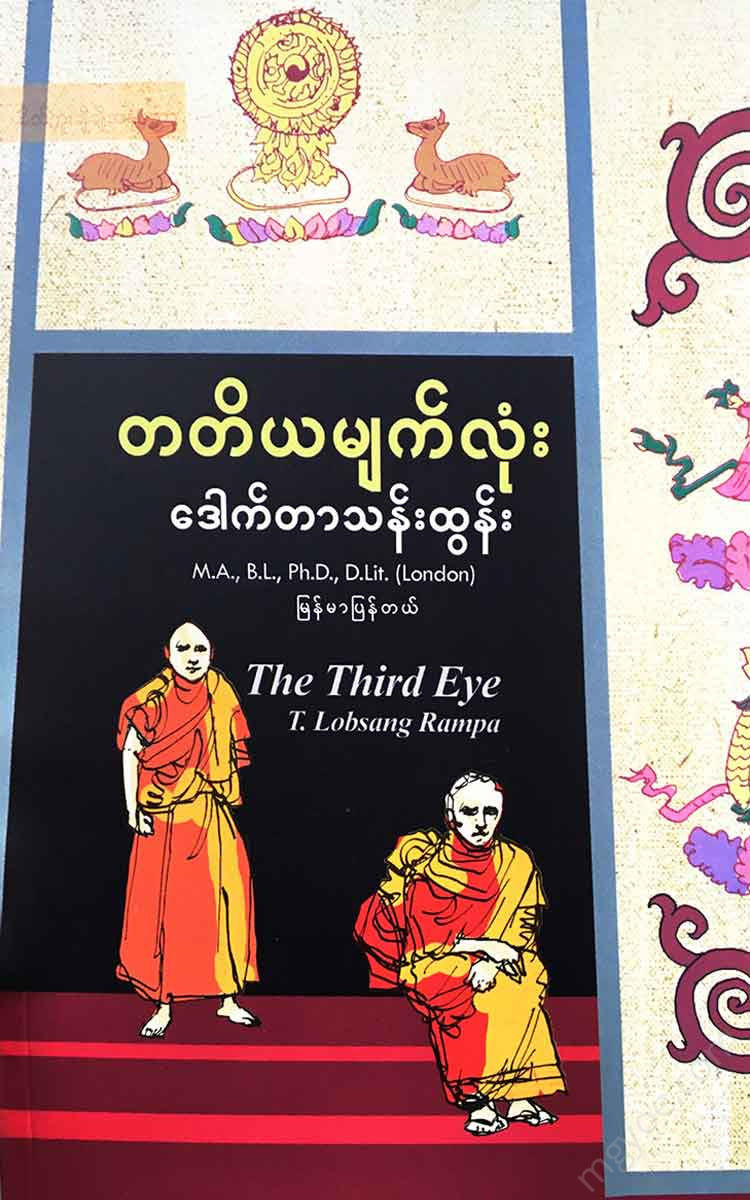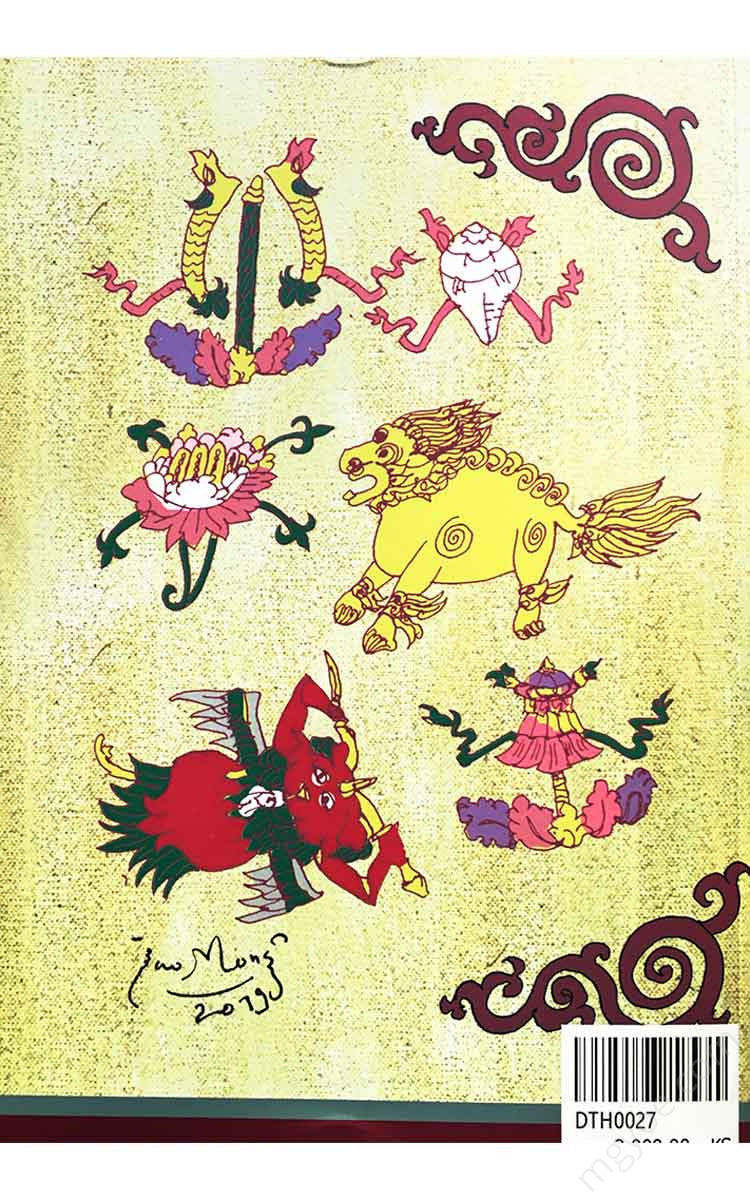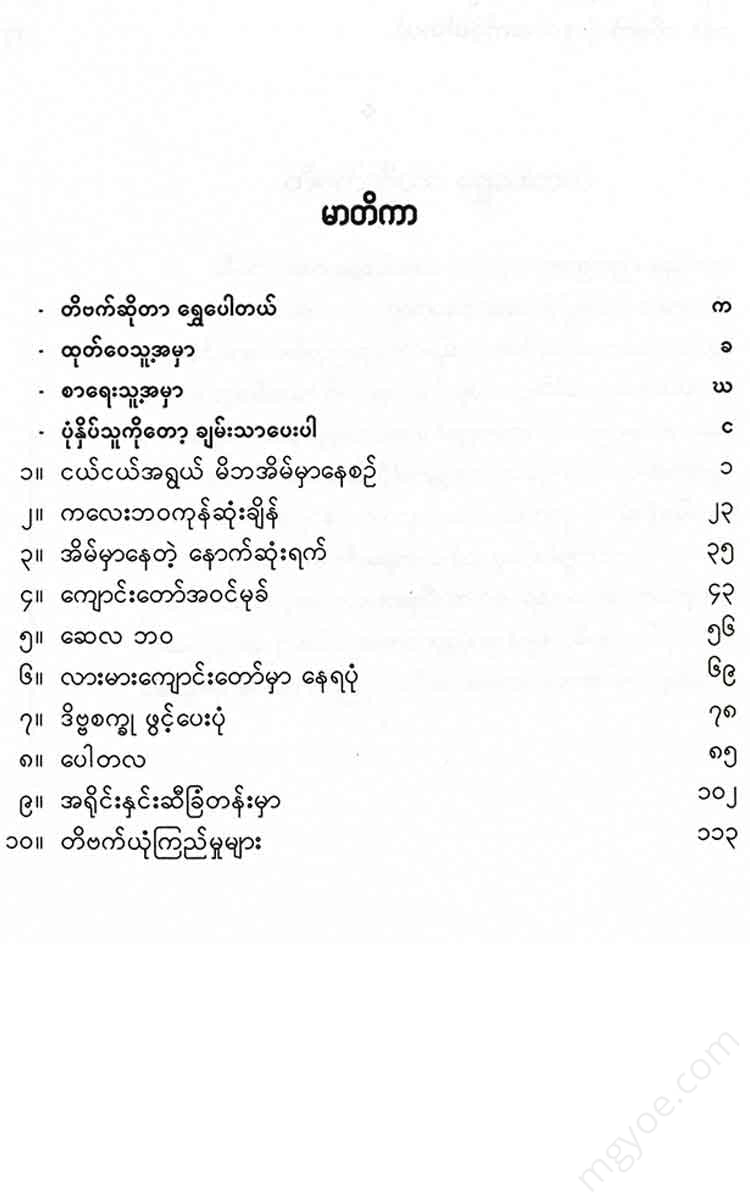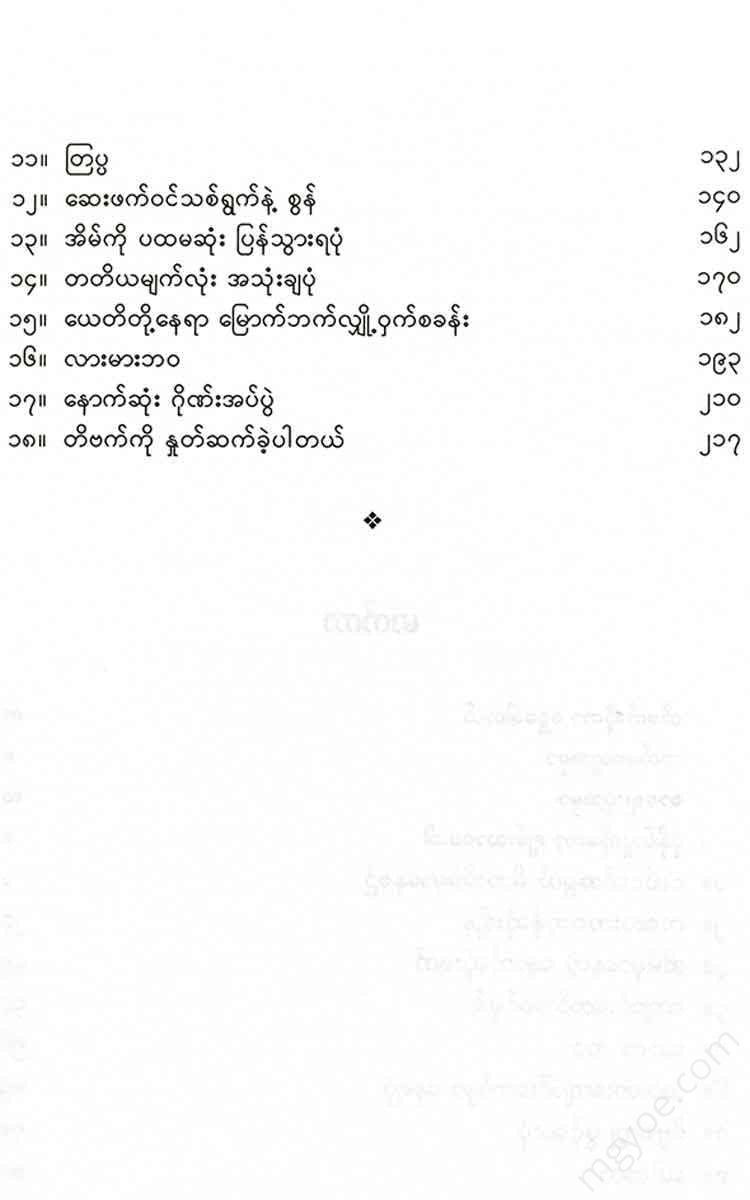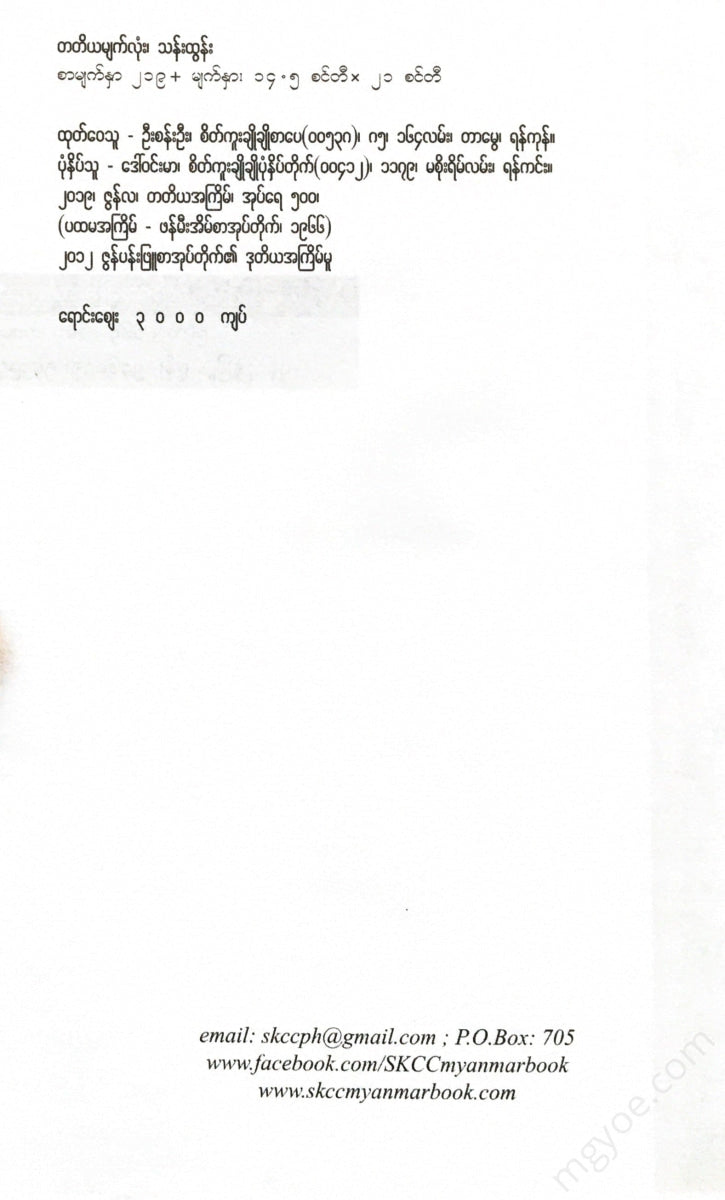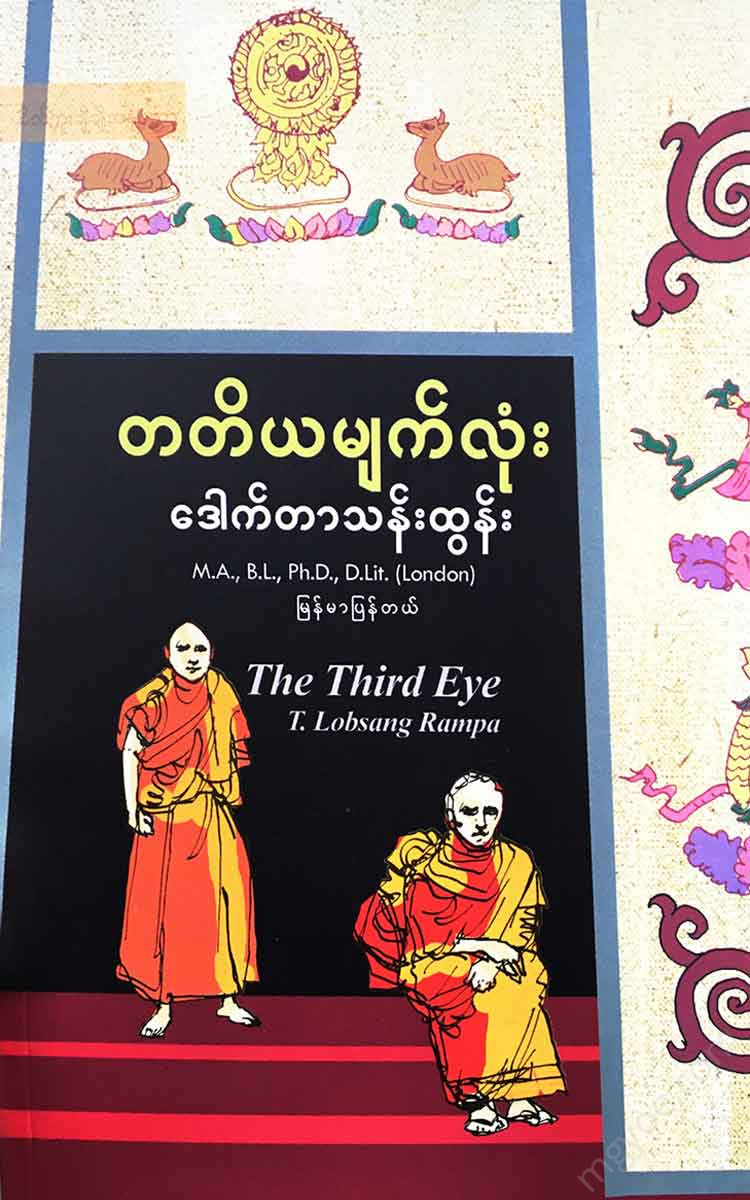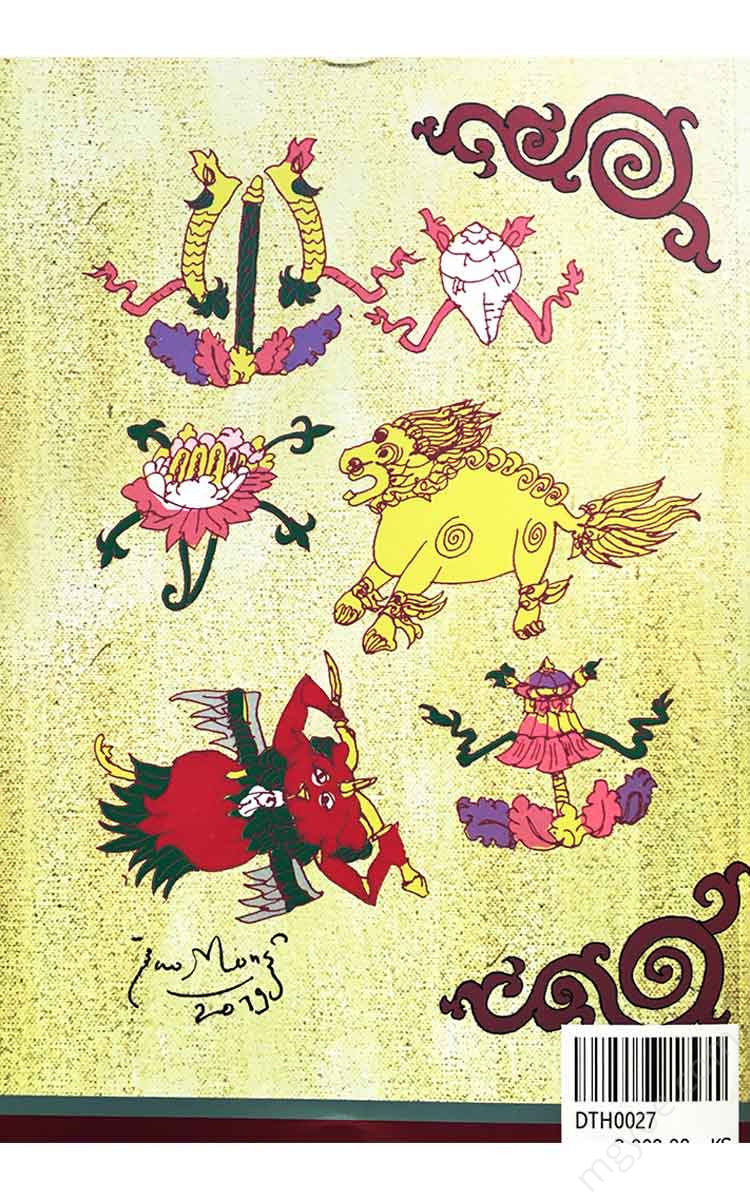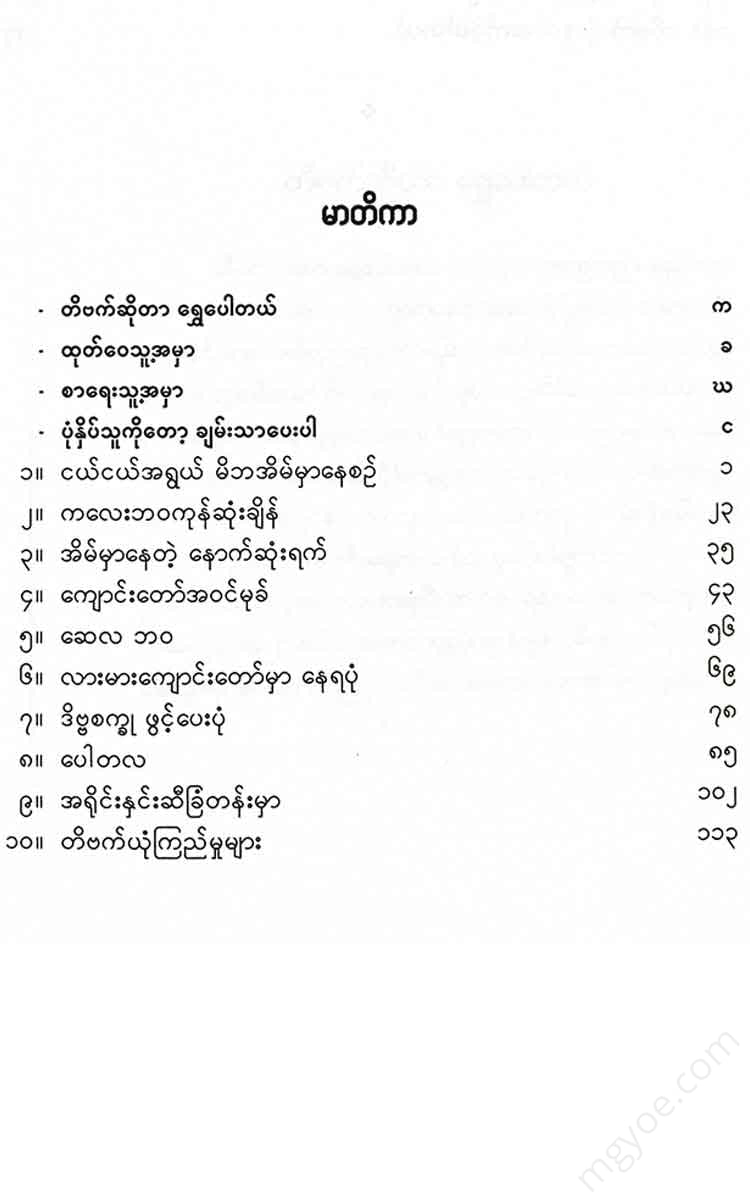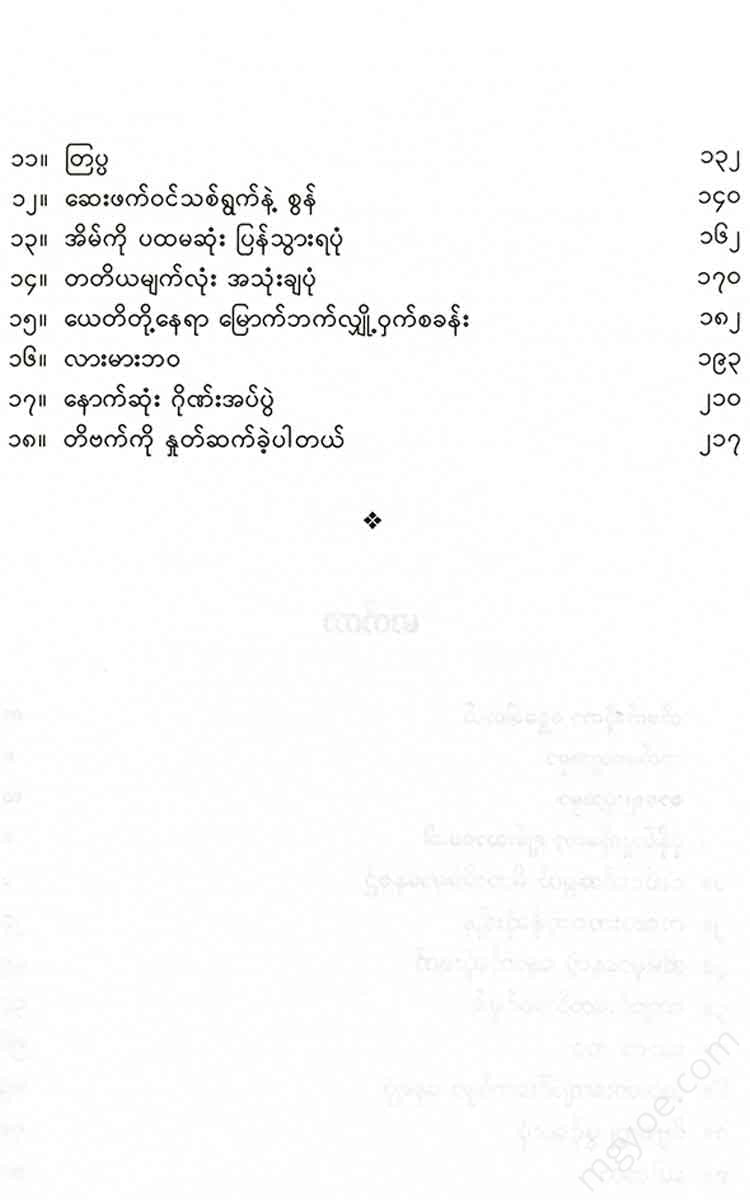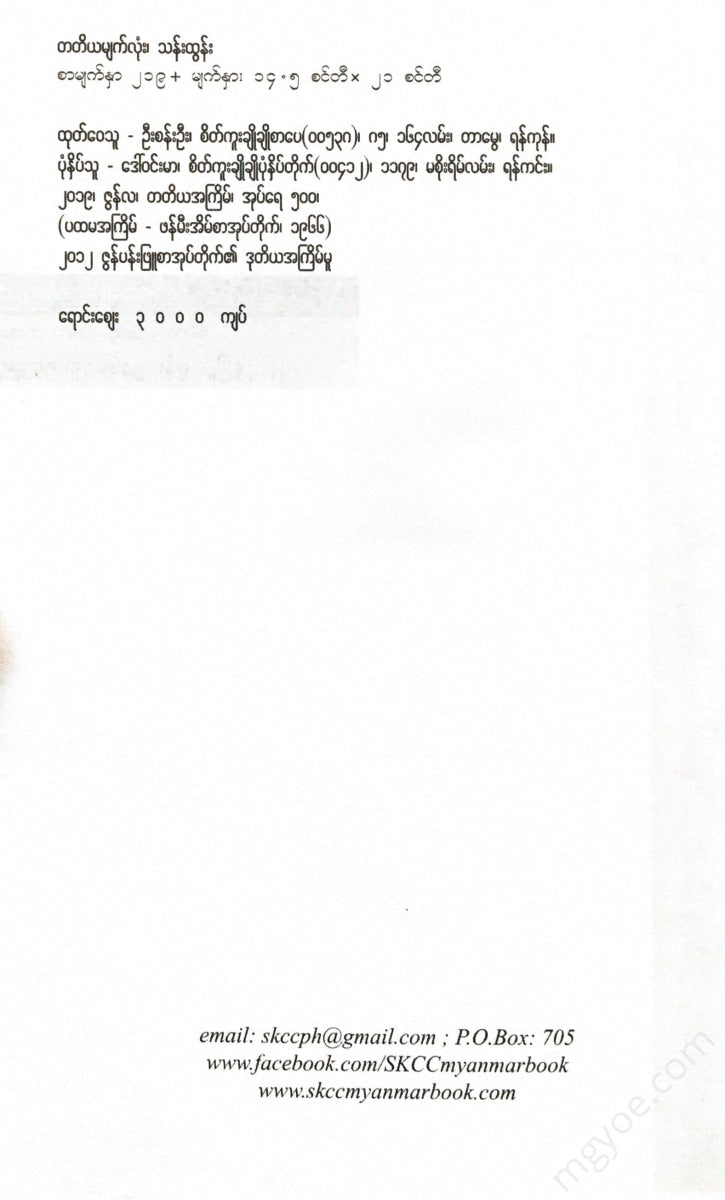စိတ်ကူးချိုချိုစာပေ
Dr. Than Tun - Third Eye
Dr. Than Tun - Third Eye
Couldn't load pickup availability
"Hey, hey, I'm a four-year-old, I can't sit still on a horse. You're not a stubborn person, are you?"
As he said this, the old man spat and kicked the saddle of the horse I was riding. The more the horse spooked, the more trouble I was in.
The golden hills and peaks of the Paudel Monastery were shining brightly in the sunlight. The blue water of the Nagaraja Monastery pond was also rippled by wild ducks. Along the stone path in the distance, I could hear the slow-moving sound of the oxen coming out of the lamasery, bellowing. Nearby, the sound of the monks practicing their instruments was heart-pounding.
But I don't have time for these daily little extracurricular activities. I'm currently trying very hard not to fall off my horse. My horse, named Nakim, is also a bit of a jerk. He doesn't want to be on his back, he just wants to be free to eat grass. He wants to be on his phone, kicking and rolling.
Old Tzu is a man who speaks little and is strict with his rules and commands his subordinates without any mercy. He has been a tough man all his life. He can tame a four-year-old. He can teach him to ride a horse. He would be the most terrible person to do such a thing. A real Khan. They usually choose their subordinates because they are big and strong. They are about seven feet tall. They are also tall in proportion to their height. They wear thick cotton and loose clothes, so they look much bigger than they really are. Their homeland is eastern Tibet. These subordinates are also tall and strong. They are often deliberately selected and appointed as the (guard) of the monks in lamaseries. They have thick cotton on their shoulders, which makes them look even bigger. They are also blackened and their faces are very scary. The long staff is their weapon. So the person who is beaten must feel uncomfortable. They are not people who are quick to hit and slow to get away.
Old Tzu had also served as a monk in the past. The British invaded Tibet in 1904. The army led by Colonel Young Jospin fired artillery and killed many people. It was believed that this would improve relations with Tibet. Old Tzu was also among the soldiers at that time. His left leg was paralyzed due to a slight dislocation of his hip. So he had to retire from military service and become a guardian of the young prince. He hated the job of babysitting.
My father is an important person in the Tibetan government. My mother's family is one of the top ten families in Tibet. So my parents are influential. They are in the country. Next time I'll talk to you about how the Tibetan government is run.
My father was a big man. He was about six feet tall. I heard he was very strong. When he was young, he could lift a horse off the ground. I once defeated and killed the strong man from Khannam, the one I mentioned earlier.
Most Tibetans have dark hair and dark eyes. My father is different. He has dark hair and dark gray eyes. Sometimes, in my opinion, he is not angry, but he is very angry.
I was not close to my father. We did not see each other every day. When there was trouble in Tibet, my father and I were not close. When the British invaded in 1904, the Dalai Lama fled to Mongolia. At that time, my father took over the government. The Dalai Lama also visited Beijing at that time. He returned to Nay Pyi Taw in 1909. China also rebelled against the British and attacked Lhasa again in 1910. This time, the Dalai Lama went into hiding in India. When the Chinese rebelled in 1911, the Chinese withdrew from us.
The Dalai Lama returned to Lhasa in 1912. In the absence of the abbot, my father was tired of running the government. My mother said that my father was not as angry as before. He could not find time to spend time with his son and daughter. We never knew what my father was like. My father especially could not look at me. So, as my father used to say, "For better or for worse, old man Tzu will do as he pleases," and I gave up.
The Tibetans do not tolerate poor horsemanship. In Tibet, the children of the upper classes are taught to ride horses before they can walk. Since there are no wheels or carriages, it is very important to be skilled in horsemanship. No matter what journey you make, you can only go on foot or on horseback. So the good Tibetans practice riding horses all day long. They can stand on a small wooden saddle on a galloping horse. They can shoot guns while riding. They can also use bows and arrows. When riding in a group, they can jump and change horses. I am four years old, but I can't sit in the saddle all the time. I don't like to be rude to people who are upset.
My horse, Nekkim, is a long-tailed, long-headed horse, but he is very intelligent. He knows how to make a weak person fall from the saddle. He runs forward quickly and stops when his head hits him. He flies off his head and does a full somersault, and then I fall flat on the ground. He then looks at me with a look of as if I don't know anything. Tibetans don't ride horses very much. When they need exercise, they canter. If they go regularly, they think they are fast.
Tibet is a religious country. It does not want to “progress” like other countries around the world. It only wants to examine the Dharma and suppress human greed. The wise people in the country have long known that Westerners have their eyes on the rich resources of our country. They have already calculated that if they come in, peace and prosperity will collapse.
I am from Lhasa. We live in a modern and upscale neighborhood called Linqiao. The main road that goes around Lhasa passes through our place. It is also a place where the pagodas are shaded. Pilgrims usually go up the three-story road that passes through here. Our two-story building faces the road. All houses are not allowed to be higher than two stories. This restriction is made so that His Holiness the Dalai Lama does not have to climb up. Since His Holiness only comes out once a year for a festival, almost every house has a temporary wooden tent on the roof of the house. It lasts for at least eleven months.
Our house is made of stone and brick. It is the house where our ancestors lived. The house is in the middle of a square. There is a large garden in the middle of the house. The animals that need to be used in the house, such as horses, are kept on the ground floor. The people are on the upper floor. There are stone steps to go up and down, which is quite convenient. Because in other houses, wooden stairs are placed steeply, or you have to climb up and down on wooden poles with ropes attached to them. If you don't practice climbing, your legs will get bruised. They usually eat food made with butter made from cow's milk, so they hold the butter in their hands and climb down and up, so it is slippery. If you are not careful, you will quickly reach the ground.
When the Chinese came and attacked in 1910, our house was partially destroyed. The inner wall also collapsed. When we repaired it, my father built a four-story building. No one would object to building a four-story building because it would not directly face the street where the Dalai Lama used to walk.
The main entrance gate has been covered in soot and smoke for centuries. The Chinese invaders, unable to break down this gate, have broken down the wall and entered the house. At the entrance is the treasurer's office. He can see everyone who comes in and goes out. He manages the household staff. He has the power to hire and fire people. He can also control them. When the Lamas' monastery blows the trumpet at sunset, beggars often come to the house to beg for a meal. Good leaders always give food to the poor in their fields. Sometimes, among those who come to beg are prisoners in chains. There are not many prisons in Tibet. Prisoners have to beg for their own food.
They don't usually condemn those who are in prison. They are punished because they are unlucky. They are not free from their own sins. They are treated with mercy because they have suffered this much because they were wronged.
Adjacent to the treasurer's room, on the right, are the rooms of the two resident monks. Two monks are sent out from the monastery in turn to worship on behalf of the household and to bless the household with whatever they do. They are always at home. If you are a little lower in rank, you only need one resident monk. You can ask them for advice on anything. They will pray for you and give you alms. After three years, the old monk returns to his respective monastery and a new monk takes his place.
There is a temple on each side of the house. The altar is decorated with wooden carvings and is constantly lit. The seven cups of cold water are washed several times a day and filled with fresh water. Since the water is used for drinking, it must be specially purified. The monks in the house eat separately from the household members. Only when they eat well can they pray well. Then they can pray to the gods that this house is full of wealth and happiness.
To the left of the treasurer is the legal advisor's room. He advises on all legal matters in the household. Our people have great respect for the law. A man like my father should be a role model in respecting the law.
My brother Palazo, my sister Yasodhara, and I, the three siblings, live on the farthest side of the house from the road. On the left side of our house is the pagoda. On the right side is the schoolroom. The servants' descendants also come to this room to study. Our lessons are many and varied. We can learn endlessly. We can only learn so much. Brother Palako, this life in this body is not long. Since he was weak from the beginning, his parents treated him harshly, and he died quickly. Before he was seven years old, he went back to the kingdom of the monks. Yasodhara was six years old.
I was four years old at the time. I can still see them carrying his body away. The monks cut his body into pieces and fed it to the crows, as was their custom.
Now that I am the heir to the family, I have to study more than before. I need to be educated to be worthy of the heir. There is no hope for horse riding. My father is also a strict disciplinarian. And since he is a prince related to the school, he strictly disciplines his son to be a model.
In our country, the higher the status of a young prince, the more he has to work hard. Some good people say that a child is a child. They should be given as much as a child is worth. My father is not on this list. My father said that the children of the poor will be poor throughout their lives, so they should be treated with kindness when they are young. The children of the rich are the heirs of wealth, so they are supposed to be kind and compassionate to others when they grow up. The government's policy is the same. In this way, a weak child is a hero. A child who is not a hero will be thrown into prison. No matter how bad the situation in the world is, he will get used to it and will not have to worry about death anymore.
Tzu was sitting at the entrance to the lower level. Having served as a monk for many years, he had to deal with many people. Now he would not be far from people. He was close to his place and the stables. Father's horses and all the other animals that he worked with were all around him. The grooms hated Tzu. They didn't like him coming in and managing things. When Father went out, six uniformed soldiers would guard him. Tzu inspected and criticized the uniforms of the soldiers. They made sure that everyone was in good shape. The soldiers didn't like that either.
These six warriors, ready on horseback, lined up against the wall.
